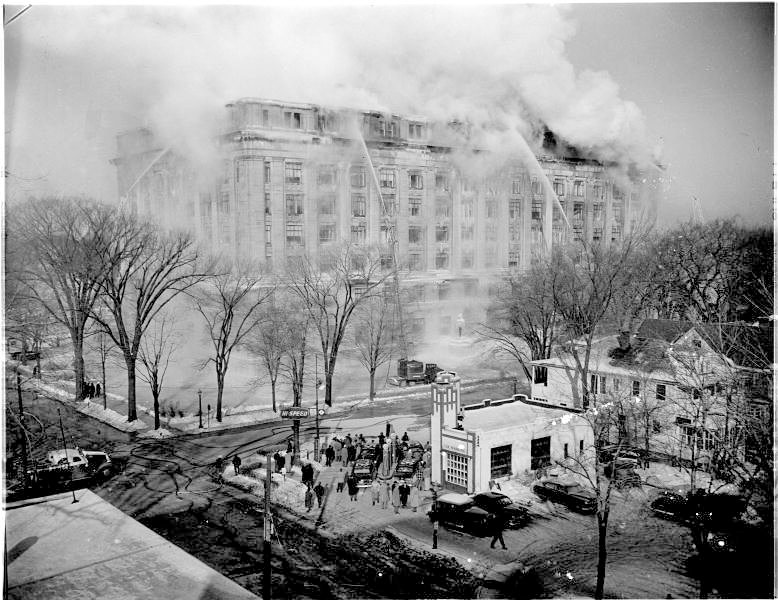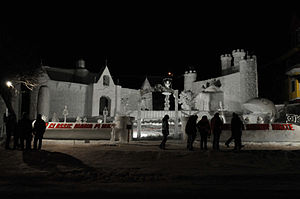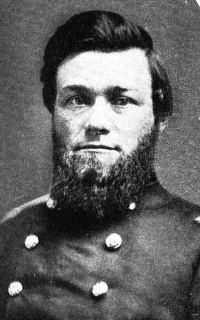Born in New York on February 8, 1818, Austin Blair moved to Jackson, Michigan in 1841. Strongly opposed to slavery, Blair helped to found the Republican Party in 1854 and served in the state legislature before being elected governor in 1860. Blair lead the state through most of the Civil War, supporting the 90,000 Michigan men who joined the Union Army.
A statue of Blair was dedicated on the east side of Capitol Square in 1898, making him the only governor to have a personal monument on the #mistatecapitol grounds.
A portrait of him also hangs at the head of the Senate Chamber.
Sources:
State Capitol Facebook Page
On February 8, 1951, a fire caused over $4,000,000 damage to the state’s 28-year-old seven story office building at 300 S. Walnut.
Numbed by temperatures that dipped to 10 below zero, firemen from five cities joined in the fight to bring the stubborn fire under control.
Giving firemen a helping hand, as water ran down the streets, were employees of the public service department. They brought snow removal equipment into action, pushing the slush away and keeping drains open. In some places on Walnut St. the water was six to eight inches deep.
Lost on the mezzanine floor were valuable state records, some of them dating back to the start of state government. Valuable papers were stored there by almost every department with offices in the state office building. …
The Michigan State Library, also located in the building, also received extensive damage.
About 9 o’clock Thursday night, at the request of Gov. Soapy Williams, Fire Marshal Renner summoned department heads and supervisors back to the building to carry out any important papers that could be rescued. By this time, access to the building was limited to the first floors by smoke that rolled through the structure to the basement.
The cause?
Fearing that he would be drafted to fight in Korea, a state employee set a fire in the Lewis Cass Building in Lansing. He went to prison instead, but much of the state library and archival collection was destroyed.
After the fire was put out, state workers turned to the task of trying to save items damaged by the fire. See Book Rescuers in 1951. A small collection of photos from the LIFE Archives, taken by Thomas Mcavoy, show the sheer awesomeness of librarians at the time trying to dry out state library books damaged by efforts to fight the Lewis Cass State Office Building fire.
Sources :
Lansing State Journal, February 9, 1951
Michigan History, January/February 2011.
Bill Castanier, “Memories of Lansing’s most devastating structural fire“, City Pulse, February 11, 2021.
Also mentioned in Lost Memory – Libraries and Archives Destroyed In the Twentieth Century, prepared for UNESCO on behalf of IFLA by Hans van der Hoeven and on behalf of ICA by Joan van Albada. – Paris : UNESCO, 1996. – ii, 70 pp. ; 30 cm. – (CII-96/WS/1)
Pictures of the Book Rescuers 1951, Vintage Everyday, April 25, 2015. A small collection of photos from the LIFE Archives, taken by Thomas Mcavoy, show the sheer awesomeness of librarians. Pictured in 1951 drying out state library books damaged by fighting the Lewis Cass State Office Building fire in Lansing, Michigan; it was quite the undertaking.
Life Magazine, March 19, 1951 : article starts on page 59. The fire was started by a 19 year-old Naval Reservist who feared being sent to war in Korea and thought that “a little fire” would gain him the probationary status he coveted. The 1951 disaster destroyed much State property, including some government records. The fire proved an object lesson on the importance of record keeping. Many documents were unrecoverable and proper inventories didn’t exist.
On this day, Beggar’s Banquet opened in East Lansing, Michigan.
Founded by Robert Adler, a MSU graduate student, and three friends, Charlie Rose, Christopher Blunt, and Martin Richard, the restaurant’s name was taken from a Rolling Stones album.
Although the restaurant was noted for its higher end items like chicken kiev, liver pate, and roasted New York strip steak with Frence bordelaise sauce, the original menu also listed quirky items such as the Richard M. Nixon Memorial pickled bologna sandwich for 90 cents and a fiery bowl of chili called sympathy for the devil (another Rolling Stones song reference) priced at 95 cents and served with a draft beer for just a dime.
Governor Engler and Governor Blanchard used to eat there on occasion; and Governor Engler even had to wait at the bar until a seat opened up on the day he won his initial election.
One of the original partners, Charlie Rose, a big hockey fan, got Beggars to sponsor a pee wee hockey team. Rose also helped organize and play in what became the legendary “Pigs vs. Freaks” football game, which raised money for the St. Jude Children’s Research Hospital in Memphis, Tennessee. One game had over 40,00o attendees in Spartan Stadium watching police members (pigs) battle against hippees (freaks) and was the inspiration for the movie Off Sides by MSU graduate Jack Epps Jr. of Top Gun fame.
Source : Bill Castanier, “Beggar’s Banquet Hosts 50th Anniversary Celebration”, The Pulse, Feb. 8-14, 2023.
 Historical marker text : Leaving the chaos of the 1848 German Revolution, Bernhard Stroh emigrated from Kirn, Germany, to South America. He soon decided to try his fortune in another German settlement, and in 1850 he arrived in Detroit. Trained as a brewer, Stroh opened a brewery on Catherine Street that same year. He developed a market for a new light lager beer among the larger German immigrant population. Pushing a cart through the city, he sold his beer from door to door. At his death in 1882 the Lion Brewery had become a thriving business to pass on to his sons, Julius and Bernhard Jr. They expanded the company and in 1902 changed the name to the Stroh Brewery Company. Today members of the Stroh family still manage what is one of Michigan’s major family businesses. [Believe it or not but the The Stroh marker was offered for sale on eBay in 2000. After intervention by the Attorney General, the marker was returned to Michigan from Florida and is now in Lansing.]
Historical marker text : Leaving the chaos of the 1848 German Revolution, Bernhard Stroh emigrated from Kirn, Germany, to South America. He soon decided to try his fortune in another German settlement, and in 1850 he arrived in Detroit. Trained as a brewer, Stroh opened a brewery on Catherine Street that same year. He developed a market for a new light lager beer among the larger German immigrant population. Pushing a cart through the city, he sold his beer from door to door. At his death in 1882 the Lion Brewery had become a thriving business to pass on to his sons, Julius and Bernhard Jr. They expanded the company and in 1902 changed the name to the Stroh Brewery Company. Today members of the Stroh family still manage what is one of Michigan’s major family businesses. [Believe it or not but the The Stroh marker was offered for sale on eBay in 2000. After intervention by the Attorney General, the marker was returned to Michigan from Florida and is now in Lansing.]
Beer was brewed in Detroit as early as 1836. By the eve of the Civil War there were around 400 breweries in Michigan’s largest city. One of these was operated by Bernhard Stroh, who began brewing beer in Detroit in the 1850s. By the 1880s, Stroh was Detroit’s biggest brewery. In the years following World War II, Stroh fought with Goebel and Pfeiffer for dominance in the city. By 1982, Stroh was the nation’s third largest brewery, but Stroh’s acquisition of Schlitz led to the closing of the Detroit plant.
25 years later, many regional breweries are still going strong in Michigan, including Bell’s Brewery Inc. of Kalamazoo, Keeweenau Brewing Company of Houghton, Right Brain Brewery in Traverse City, Michigan Brewing Company of Webberville, New Holland Brewing Company of Holland, Short’s Brewing Company of Bellaire, and dozens of others. For more possibilities, consult Michigan Brewpub and Microbreweries
Sources :
Michigan Every Day.
Stroh’s Brewery, HistoricDetroit.org
Stroh’s Brewery Company wikipedia entry
Darrell Clem, “Stroh’s collection gives toast to once-mighty Detroit beer empire“, Hometown Life, February 1, 2018.
Robert Allen, “Book: Family behind Stroh’s beer one of privilege, self-indulgence“, Detroit Free Press, April 30, 2016; updated July 26, 2016.
Beer money : a memoir of privilege and loss / Frances Stroh. New York, NY : Harper, an imprint of HarperCollins Publishers, [2016]

On February 8, 1997, Detroit Red Wing coach Scotty Bowman won the 1,000th regular season game of his storied career, a 6-5 overtime victory over the Penguins at the “Igloo” in Pittsburgh (ironically, the previous team Bowman coached).
Welcome to Winter Carnival 2018
Myths and Tales of the Past
in Our Frigid Forecast
February 8–11, 2018
Organized by Blue Key National Honor Society since 1934, Winter Carnival started in 1922 and has grown into one of the biggest annual winter celebrations in the nation. Known for huge, intricate snow statues around campus and the community, Carnival also brings Huskies together to compete in broomball, comedy skits, human ice bowling, and a queen coronation.
Visit the Winter Carnival Website.
Mary Wilson, a founding member of The Supremes, died Monday at her home in Las Vegas, her publicist said. She was 76.
Wilson, who grew up in a housing project in Detroit, was an original member of the iconic Motown group known for a string of hits including “Stop! In the Name of Love” and “Back in My Arms Again.”
“The Supremes were always known as the ‘sweethearts of Motown,'” Berry Gordy, founder of the Motown record label, said in a statement. “Mary, along with Diana Ross and Florence Ballard, came to Motown in the early 1960s. After an unprecedented string of No. 1 hits, television and nightclub bookings, they opened doors for themselves, the other Motown acts, and many, many others.
The Supremes claimed a dozen No. 1 singles, five of which were consecutive from 1964-1965. “Where Did Our Love Go,” “Baby Love,” “Come See About Me,” “Stop! In the Name of Love” and “Back in My Arms Again,” all topped the charts.
They were inducted in the Rock & Roll Hall of Fame by Little Richard in 1988.
Source : Phil Helsel, “Mary Wilson, founding member of The Supremes, dies at 76”, Today, February 9, 2021.
On this day, Dutch immigrants fleeing religious persecution and economic distress followed their leader Rev. Albertus Van Raalte to West Michigan and founded Holland.
Sources :
Zlati Meyer, “City of Holland Founded by Dutch”, Detroit Free Press, February 3, 2013.

George Armstrong Custer, the famous Army general who grew up in Monroe, married Monroe native Elizabeth Clift Bacon on February 9, 1864.
Bacon, known as Libbie, was the only surviving daughter of an important local judge who initially opposed the marriage, according to the book “Elizabeth Bacon Custer and the Making of a Myth” by Shirley Leckie. The couple had met at a party in November 1862.
Once married, Elizabeth Custer tried when possible to stay with her husband during encampments and posts. After she was widowed at age 34, she worked tirelessly to polish her husband’s posthumous reputation. Her constant portrayal of him as a war hero and national martyr angered his detractors, yet many reserved their criticism of him until after her death in 1933.
For the full article, see Zlati Meyer, “This week in Michigan history: George Custer marries Monroe native Elizabeth Bacon”, Detroit Free Press, February 9, 2014.
Bill Loomis, “Custer and Michigan: A mutual love affair”, Detroit News, March 6, 2016.
February 9, 1864
The Great Escape, American Civil War era.
In one of the Civil War’s great prison escapes, William McCreery of Flint was one of many Union officers who tunneled their way out of Libby Prison in Richmond, Virginia. McCreery, who entered service in May 1861 as a sergeant in the Second Michigan Infantry, and later served as a Lieutenant Colonel commanding the 21st Michigan Infantry.
He fought with valor and was serious wounded at Williamsburg, Virginia, and at Chickamauga. In the latter battle, he was captured by the Confederates and sent to the rebel prison in Richmond.
After his escape in 1864, he eventually resigned his commission on account of the many wounds he received during the war.
The rest of the story.
Born in Mt. Morris, New York, in Aug 27, 1826(?), McCreer moved to Genesee County with his parents in 1839.
He was admitted to the bar of Genesee county in 1859 and practiced law until the breaking out of the Civil War.
Returning to Flint after serving in the military, McCreery entered the general merchandising business with F. W. Judd and also participated in the lumber industry with a sawmill on the banks of the Flint River just south of the Saginaw Road bridge.
In the Grant administration, he became the district collector of internal revenue.
He was involved in the Flint City Water Works Company as its president and as an original stockholder.
He also invested in the Grand Trunk Railway and facilitated a Flint-Lansing extension.
He was elected as the ninth mayor of the City of Flint in 1865 serving two 1-year terms.
Elected Michigan State Treasurer in 1875 serving until 1878.
He served as a member of the state board of agriculture for seven years.
Delegate to Republican National Convention from Michigan, 1888.
Appointed in 1890 as U.S. Consul in Valparaiso, Chile under the Harrison administration.
He helped organize and served as the first director of First National Bank of Flint.
McCreery died on December 9, 1896 in Flint, Michigan and was laid to rest at Glenwood Cemetery, Flint, Michigan.
Sources :
Michigan Historical Calendar courtesy of Clarke Historical Library at Central Michigan University.







